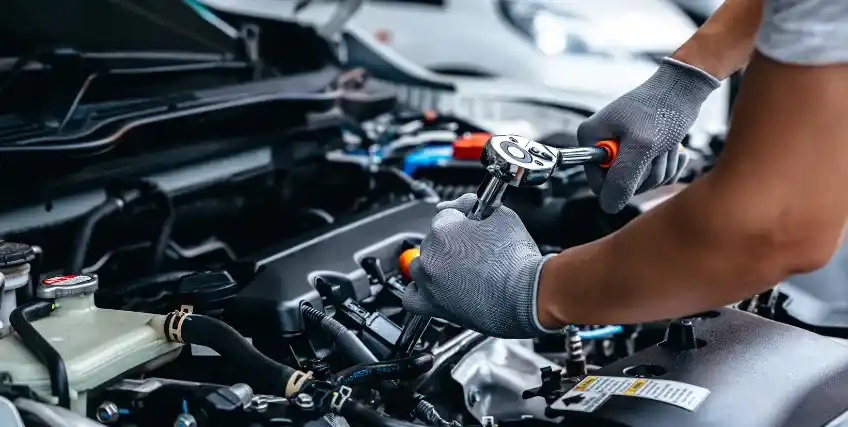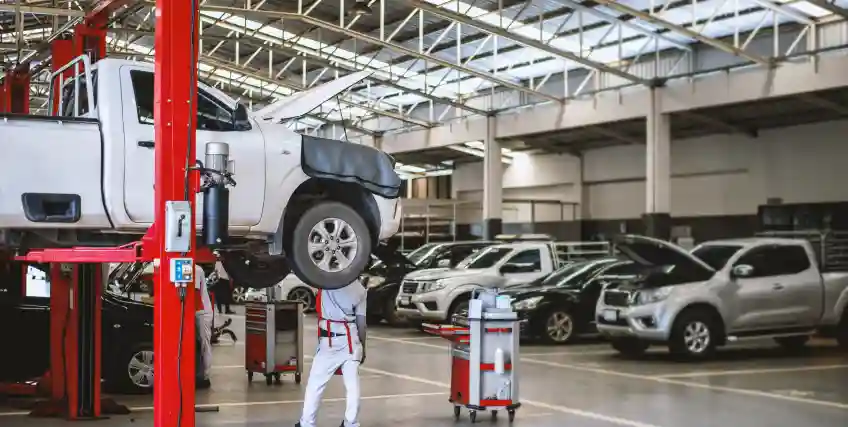Auto Repair Shop Financing: Solutions for Cash Flow Challenges
October 31, 2025 | Last Updated on: October 31, 2025

Key Takeaways:
- How auto repair shop financing helps manage cash flow and support growth.
- Common financing options such as SBA loans, equipment financing, and credit lines.
- What lenders look for and how to prepare for the financing process.
Running an auto repair shop in the U.S. is no easy feat. The cost of equipment, inventory for car repairs, seasonal slowdowns and the unpredictability of customer traffic make many small business owners feel the squeeze. This is why finding the right auto repair shop financing solution is crucial. An ideal financing solution helps you keep operations smooth, cover unexpected repair costs, and even invest in growth without falling into cash-flow trouble.
For business owners who are just starting out, securing funding to start a business in the auto repair world is one of the foundational steps to success. Even for established shops, knowing how to get business financing and use it strategically makes a big difference.
In this article, discover what auto repair shop financing means, explore the most relevant options, and strategies on how to qualify, choose, and manage funds wisely.
Cash Flow Challenges in Auto Repair Shops
Cash flow for an auto service or auto repair business can be unpredictable. Here are some of the common challenges faced by auto repair shop owners:
- Many customers may delay payment for large-scale services, or you wait on insurance reimbursements.
- Up-front costs can be high for inventory and equipment.
- Even when the business is slow, the payroll remains fixed.
- Facing difference in repair volumes due to seasonal variation.
- Using credit cards or short-term financing to cover costs may add stress during monthly payments.
Maintaining stable cash flow is crucial because when you can't cover payroll or parts inventory or you're faced with major equipment failure, you may lose revenue or incur delays. That's where adequate auto repair shop financing becomes a great helpline.
What Is Auto Repair Shop Financing?
When we talk about auto repair shop financing, we mean a range of financial tools and funding mechanisms designed specifically or suited to the needs of auto repair shops, garages, and automotive service businesses.
Auto repair shop loans help owners manage daily business operations, working-capital needs, payroll, inventory purchases, and utility expenses. They also support major investments, such as equipment upgrades or acquisitions, including diagnostic scanners, lifts, and management software.
Beyond that, auto repair shop financing helps owners expand business, either by adding new service bays or opening a second location. This is a financial solution that primarily helps smooth out cash-flow timing between invoices and customer payments.
Common Types of Auto Repair Shop Financing
Here are several auto repair shop financing options that are frequently used, along with tips and caveats. Each option can be used to address different parts of your cash flow equation.
1. SBA Loans (7(a) and 504 Programs)
These are government-backed loans via the SBA, offered by participating lenders. They are among the more affordable options in terms of interest rates and structured repayment.
- The 7(a) loan program is flexible. Terms depend on size of loan, collateral, and business profile.
- The 504 loan program focuses on major fixed assets (real estate, large equipment) and lets you borrow long-term at fixed rates.
Pros: Lower interest than many short-term loans; long repayment terms for qualified applicants; supports growth or equipment purchase.
Cons: Longer application process, more rigorous credit check, may require collateral, and you'll need to demonstrate current/future cash flow stability.
2. Equipment Financing
Equipment financing is ideal if your auto repair shop needs a new lift, scanner, alignment machine, or major upgrade. The equipment itself often serves as collateral.
Pros: You may get the tool you need, may spread the cost over time, and match the investment to the productivity gains.
Cons: Monthly payments mean fixed obligations; if business dips you still owe the payment; interest or fees may be higher than other bank loans.
3. Business Line of Credit
A line of credit works much like a business credit card that lets you draw funds when needed, pay interest only on what you've used, and pay down the balance as cash comes in.
Pros: Flexible access to funds, suitable for smoothing cash flow between jobs, handling unexpected repair costs or slow weeks.
Cons: Rates may be higher than term loans; withdrawals may trigger origination or servicing fees; you must track and discipline repayments to avoid long-term debt.
4. Merchant Cash Advances (MCAs)
In an MCA, a lender advances funds to a business, and you repay through a portion of your future receipts.
Pros: Quick application process can be helpful for short-term cash needs (e.g., major equipment failure, parts inventory shortage).
Cons: Often high cost, heavy fees, and an effective interest rate (or factor rate) may be steep; using MCAs repeatedly can trap you in a cycle.
5. Short-Term Working Capital Loans
These are term loans designed for short durations to cover urgent expenses such as payroll, parts inventory, or catch‐up after slow months.
Pros: Quicker access than long term loans, less bureaucracy.
Cons: Higher interest rates; monthly payments might be large relative to revenue; may not be ideal for long-term use.
6. Commercial Auto Loans
Some auto repair shops maintain a fleet for mobile repair services or provide roadside assistance. In that case, financing a vehicle (or multiple) may be needed. These loans fall under commercial auto financing rather than standard business loans.
Pros: You get the vehicle you need to expand services; monthly payments coincide with revenue from mobile jobs.
Cons: Additional vehicle maintenance, insurance costs; your revenue must support the payment plus operational cost.
7. Credit Union and Community Development Lenders
Smaller local lenders or credit unions sometimes offer favorable terms, especially if you meet certain community-based or business development eligibility.
Pros: Potentially lower interest rates, flexible criteria for borrowers with less established credit history.
Cons: Possibly less available credit, fewer specialized products, may need membership or local ties.
Tips to Qualify for Auto Repair Shop Financing
Securing auto repair shop financing (or any form of business financing) requires preparation. Here are key criteria lenders will review and steps you should take:
What lenders may look at:
- Credit score and credit history of you (the owner) and your business. A strong credit score improves your chances of credit approval.
- Business revenue and profitability: lenders want to see consistent income to cover monthly payments.
- Time in business: many lenders prefer auto repair shops with an adequate Collateral or guarantee: equipment, property, or personal guarantee may be required.
- Cash flow projections: a business plan that shows how you'll generate revenue and cover monthly payments and other obligations.
Steps to Help You Get Ready for Auto Repair Shop Financing
- Keep your financials organized: Gather your profit and loss statements, balance sheets, and tax returns so lenders can easily understand your shop's performance.
- Separate business and personal finances: Having a dedicated business bank account and clear records can make your application look more professional.
- Check your credit score: Review your credit history and fix any errors. Even with bad credit, you may still qualify, though the terms might be stricter.
- Consider prequalification: Many lenders allow you to prequalify to get a sense of your eligibility without affecting your credit score.
- Know your funding needs: Decide how much you need, what you'll use it for and how you plan to handle monthly payments.
- Review potential fees: Take note of origination fees, service charges, or late fees that might apply.
- Match payments to your cash flow: Choose loan terms and payment plans that align with your shop's busy and slow seasons.
Financing to Start a New Auto Repair Business
If you're launching an auto repair shop, you'll need to secure funding to start a business and plan for the unique financing demands of a startup. Many lenders treat startup shops differently because they don't yet have an operational track record . Here are some tips on how to approach it:
- Build a strong business plan: For example, include expected volume of car repairs, projected revenue, cost of inventory (oil change supplies, diagnostic parts), equipment costs, staffing, and monthly payments for financing.
- Be upfront about how you'll handle slow months, how you will ride out initial slow periods, and when you expect to reach break-even.
- Show the lender how you will handle installment loans, monthly payments, down payment (if required), and repayment terms.
- Since you may have a limited credit history for the new business, your credit score and personal loan profile may be especially relevant.
- If you have bad credit, you may need to secure financing through equipment leasing or credit unions that specialize in startup auto service businesses.
- Explore local small business grants, online lending platforms, community development lenders, or startup programmes that help auto repair shops.
With disciplined planning, you can launch your auto repair shop with the right mix of capital and avoid heavy reliance on high-cost debt or excessive use of your personal credit card.
Challenges and Mistakes to Avoid while Auto Repair Shop Financing
- Taking high-cost funding without ROI assessment: It's a good idea to consider whether the cost of financing will truly support your shop's growth. If the additional income or savings from the loan aren't clear, it may be worth exploring other options first.
- Ignoring hidden fees or prepayment penalties: Some loans may include origination fees, down payment requirements, or penalties for early repayment. Reviewing the fine print beforehand can help you avoid surprises later.
- Misalignment of loan term and cash flow: Try to choose repayment terms that fit your business rhythm. If your monthly payments feel too high during slower months, a more flexible plan might work better.
- Using funds for non-productive spending: Financing is quite effective when directed toward activities that generate revenue like equipment upgrades or service improvements.
- Poor documentation or application preparation: Taking time to organize your financial records, clarify repayment plans, and understand your credit history can make the application process smoother and improve your future of auto shop financing.
Conclusion
If you operate or plan to launch an auto repair shop, then auto repair shop financing isn't a side thought, it's central to your stability, growth and ability to serve customers reliably. Choosing the right financing option will help you manage the inevitable ups and downs of the auto repair business. Whether you're covering an unexpected major equipment repair, hiring a technician, investing in new diagnostic tools, or simply smoothing cash flow between major jobs, smart financing gives you more control.
Make sure you understand your eligibility, prepare your credit history and financials, plan for how monthly payments and repayment terms fit your business cycle, and avoid over-reliance on high-cost debt or credit card financing. When used strategically, auto repair shop financing and other targeted funding options can free you from the stress of cash-flow gaps, let you serve your customers better and help you grow your shop steadily.
FAQs About Auto Repair Shop Financing
1. What type of auto repair shop financing works well for a small repair shop?
It largely depends on your specific needs and business goals. If you're planning to purchase major equipment or expand your facility, options such as SBA loans or equipment financing may be suitable. For managing everyday cash flow or covering short-term expenses such as inventory or payroll, a business line of credit or a short-term working capital loan might be more practical. Always review the loan terms, interest rates, and monthly payment structure to ensure they align with your shop's income cycle and overall financial plan.
2. Can I get business financing with bad credit?
Lenders may offer higher rates or require additional collateral for businesses with bad credit. However, some community lenders and credit unions provide flexible options. Strengthening your credit history, keeping personal and business finances separate, and using prequalification can improve your chances of approval.
3. What are typical interest rates for automotive repair financing in the U.S.?
Interest rates for automotive repair financing can vary widely based on the lender, loan type, credit profile, and overall business history. In general, bank and SBA loans tend to offer more competitive rates, while short-term or equipment financing options may carry higher costs. It's important to review all loan terms carefully, including origination fees, payment schedules, and any late payment penalties before committing.
4. How long does it take to get approved for auto repair shop financing?
Approval times can differ depending on the type of financing and the lender's process. Short-term options like lines of credit or merchant cash advances are usually faster, while SBA or traditional bank loans may take longer due to detailed reviews and documentation. It's a good idea to plan ahead and apply before an urgent need arises.
5. What documentation do lenders usually require for auto repair shop financing?
For auto repair shop financing, lenders generally require financial records such as tax returns, profit and loss statements, balance sheets, and bank statements. They may also request details about your business plan, credit history, loan amount, repayment terms, and any collateral you plan to offer.
Frequent searches leading to this page
Related Articles
Term Loans are made by Itria Ventures LLC or Cross River Bank, Member FDIC. This is not a deposit product. California residents: Itria Ventures LLC is licensed by the Department of Financial Protection and Innovation. Loans are made or arranged pursuant to California Financing Law License # 60DBO-35839




